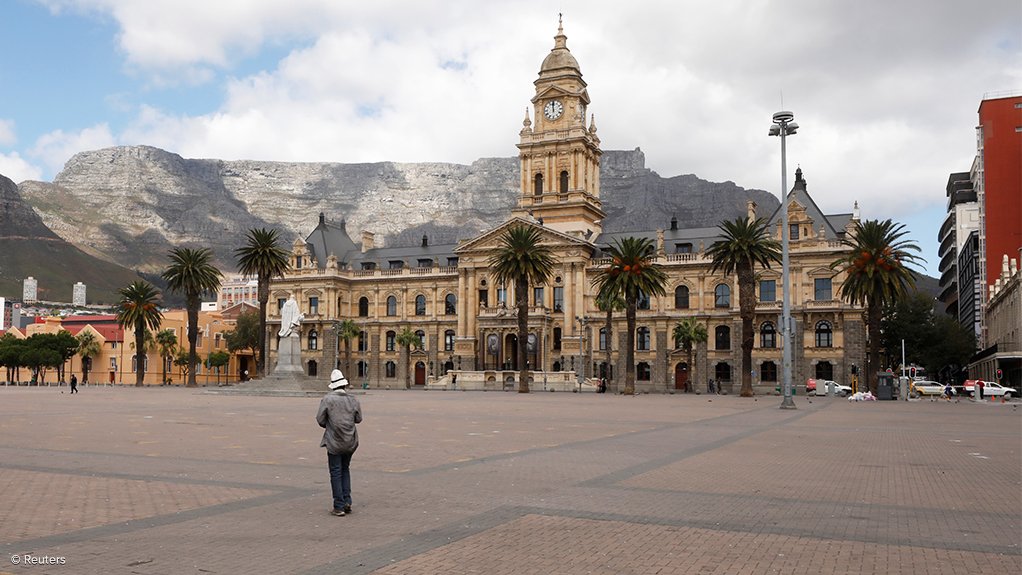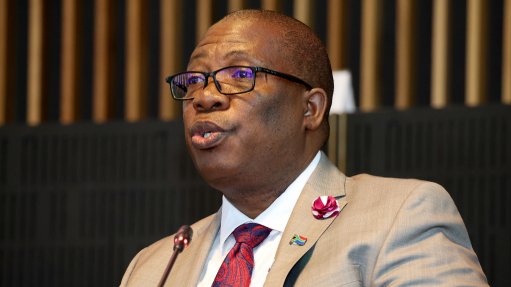Private sector’s role in job creation comes under post-SoNA spotlight


The post-SoNA debate is under way at the Cape Town City Hall, after Parliament was severely damaged in a fire in January
The respective roles of the public and the private sectors in creating jobs came under the spotlight again on Monday as political leaders responded to President Cyril Ramaphosa’s most recent State of the Nation Address (SoNA), in which he emphasised the centrality of the private sector in creating employment.
In his marathon February 10 speech, Ramaphosa asserted that business rather than government created jobs and that the “State must create an environment in which the private sector can invest and unleash the dynamism of the economy”.
The statement was generally supported by business, as was the new initiative announced to cut red tape, despite there being some circumspection over Ramaphosa setting a 100-day deadline for the reaching of a “new consensus” on the revival of the economy, given that the existing Economic Reconstruction and Recovery Plan had been widely canvassed.
However, the political leaders who responded to the SoNA on Monday latched on to the issue, in an effort to both highlight the fractures in the governing ANC on the matter and to underline their respective philosophies and approaches to job creation.
The leader of the official opposition John Steenhuisen said that large parts of the President’s speech were “straight from the DA’s playbook”, before dismissing the address by saying: “Nice words, pity it won’t happen.”
He also questioned whether he had the backing of his own party, which he said was “obsessed with centralised control of the economy and reliant on a massively bloated public sector”.
In a piece of political theatre Steenhuisen offered his assistance to the President’s reform agenda by announcing his tabling of a ‘Motion of No Confidence’ in Ramaphosa’s entire Cabinet and promised the DA’s support for various Bills once “this House fires them for you”.
The ideological divisions on the public-versus-private debate became immediately clear when, in his official SoNA response, the Economic Freedom Fighters’ Julius Malema described it as “historically and empirically incorrect to suggest that the sole role of governments and the State is to create conditions for the private sector to create jobs”.
“The history of capitalism whether private or State capitalism whether in the West or East has demonstrated that the State always plays a direct role in the creation and protection of jobs,” he said, quoting some specific examples of public sector job creation from Brics bloc countries such as Brazil, Russia and China.
“Despite this basic and verifiable reality and statistic, a president of a former liberation movement comes here to say that government does not create jobs, and the hopeless people of our people must wait for the private sector to create jobs for them,” Malema said, before going as far as to argue that “sending people to the private sector for jobs is like sending a cattle to the slaughter”.
On the other extreme, the Inkatha Freedom Party’s Narend Singh, who spoke on behalf of Mangosuthu Buthelezi, evoked a Thatcherite vision of weakened trade unions or stimulating the economy, while Freedom Front Plus leader Pieter Groenewald said he would only accept that Ramaphosa was serious about economic growth if labour legislation was amended to ensure unions had less power and if black economic empowerment and affirmative action were scrapped.
Recognising that his statement on the role of the private sector had touched a nerve, Ramaphosa used his weekly newsletter to add nuance to his SoNA speech by asserting that both a capable developmental State and a dynamic and agile private sector were required to create jobs.
“This idea is not new,” the President wrote quoting the ANC’s 1992 ‘Ready to Govern’ document, which “envisaged a democratic State with ultimate responsibility for ‘coordinating, planning and guiding the development of the economy towards a sustainable growth pattern’ in cooperation with the trade union movement, business and other organs of society.
“The document further envisages ‘a dynamic private sector, employing the skills and acumen of all South Africans…and of business activities which contribute significantly to job creation, being actively encouraged'."
While Minister in The Presidency Mondli Gungubele said he would not be distracted by the public-versus-private debate, Deputy Finance Minister David Masondo did enter the fray.
He said that government’s vision for a developmental State was not meant to obliterate the private sector. “Instead, it is meant to work with the private sector in order to drive the process of development”.
However, he also sought to put daylight between the ANC’s approach and that being proposed by the DA, indicating that the State had to intervene in those cases where there were obstacles to accessing markets, finance or technology.
Masondo also defended the State playing a role in enabling those historically excluded from the economy to become active participants.
“A failure to implement black economic empowerment and affirmative action will be nothing else but to protect colonially accumulated privileges and the only way that we will achieve a fundamental shift in our growth trajectory is by transforming the structure of the economy.”
Article Enquiry
Email Article
Save Article
Feedback
To advertise email advertising@creamermedia.co.za or click here
Announcements
What's On
Subscribe to improve your user experience...
Option 1 (equivalent of R125 a month):
Receive a weekly copy of Creamer Media's Engineering News & Mining Weekly magazine
(print copy for those in South Africa and e-magazine for those outside of South Africa)
Receive daily email newsletters
Access to full search results
Access archive of magazine back copies
Access to Projects in Progress
Access to ONE Research Report of your choice in PDF format
Option 2 (equivalent of R375 a month):
All benefits from Option 1
PLUS
Access to Creamer Media's Research Channel Africa for ALL Research Reports, in PDF format, on various industrial and mining sectors
including Electricity; Water; Energy Transition; Hydrogen; Roads, Rail and Ports; Coal; Gold; Platinum; Battery Metals; etc.
Already a subscriber?
Forgotten your password?
Receive weekly copy of Creamer Media's Engineering News & Mining Weekly magazine (print copy for those in South Africa and e-magazine for those outside of South Africa)
➕
Recieve daily email newsletters
➕
Access to full search results
➕
Access archive of magazine back copies
➕
Access to Projects in Progress
➕
Access to ONE Research Report of your choice in PDF format
RESEARCH CHANNEL AFRICA
R4500 (equivalent of R375 a month)
SUBSCRIBEAll benefits from Option 1
➕
Access to Creamer Media's Research Channel Africa for ALL Research Reports on various industrial and mining sectors, in PDF format, including on:
Electricity
➕
Water
➕
Energy Transition
➕
Hydrogen
➕
Roads, Rail and Ports
➕
Coal
➕
Gold
➕
Platinum
➕
Battery Metals
➕
etc.
Receive all benefits from Option 1 or Option 2 delivered to numerous people at your company
➕
Multiple User names and Passwords for simultaneous log-ins
➕
Intranet integration access to all in your organisation



















